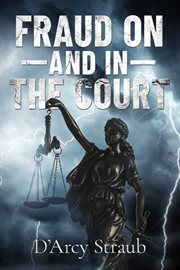Details
PUBLISHED
Made available through hoopla
DESCRIPTION
1 online resource
ISBN/ISSN
LANGUAGE
NOTES
"FRAUD ON-and in-THE COURT" tells D'Arcy Straub's story of following a vein of corruption within the federal judiciary that ultimately leads to the Supreme Court. On the second day of his confirmation hearing before the Senate Judiciary Committee in March 2017, Neil Gorsuch testified, "A wise, old judge, kind of like Judge Johnson, you're going to hear from; he's going to come talk to you from Colorado, a hero of mine, known me since I was a tot…." Upon hearing this testimony, Straub, an attorney practicing law in Colorado, realized Justice Gorsuch had violated the law-28 U.S.C. § 455(a)-that requires United States judges to recuse themselves when their "impartiality might reasonably be questioned." Straub's two appeals before the Tenth Circuit Court of Appeals prior to 2017 alleged that U.S. District Court Judge John Kane Jr. had engaged in an illegal ex parte communication during a civil trial and made an unrecorded campaign contribution that violated the City of Denver's campaign finance laws. The allegations against Judge Kane represented a substantive component of Straub's arguments before the Tenth Circuit, and Justice Gorsuch was a member of each three-judge panel deciding these appeals. Justice Gorsuch's impartiality is questionable within these decisions, as a strong possibility exists that Justice Gorsuch's bias steered-either consciously or unconsciously-the panels and decisions away from marring Judge Kane, who he considered a "hero" and had known since he was a "tot." Justice Gorsuch's failure to acknowledge his personal bias and recuse himself in accordance with the law is emblematic of contemporary America. Our innate human bias deepens in the information age, and it cripples people and the nation alike. Human bias affects a person's perception and position on political and social issues. American politics is drowning in bias that facilitates acrimony and spawns attempts to minimize opposing views through both legal and illegal election tactics. Cancel culture aims to punish those with different opinions on various social issues. Diversity and inclusion, although possessing beneficial attributes, occasionally facilitates discriminatory practices. Racism is ultimately reduced to a bias against another based upon the color of their skin. America is awash in bias that it cannot escape, and Straub explores the use of random processes and game theory to reduce or eliminate bias within society. Straub hopes his story initiates efforts to address ruinous biases, and it leads people to question their own bias
Mode of access: World Wide Web







